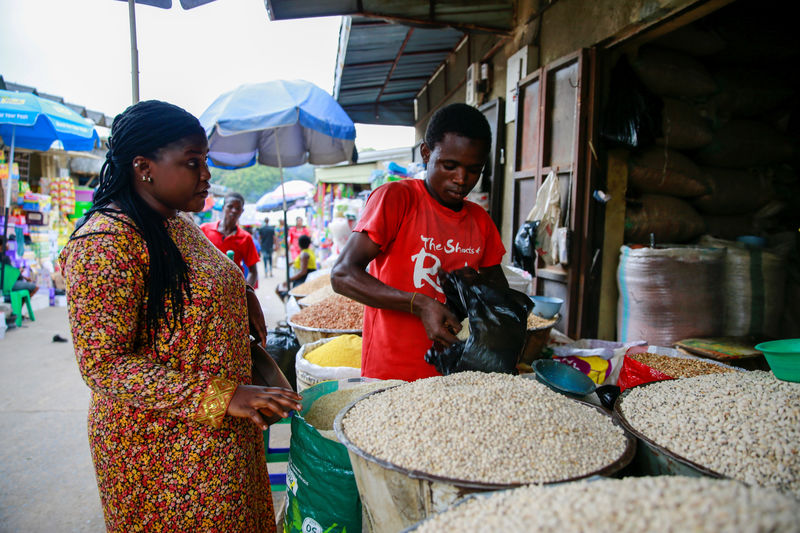Food prices, and other Nigerian horror stories (II)
After the now-infamous ‘Subsidy is gone’ moment, one would expect an array of measures put in place to cushion the nasty effects that would definitely follow, but so far all Nigerians can hear is the sound of crickets. I know I had earlier called for the Federal Government, as a matter of emergency, to please […]

After the now-infamous ‘Subsidy is gone’ moment, one would expect an array of measures put in place to cushion the nasty effects that would definitely follow, but so far all Nigerians can hear is the sound of crickets. I know I had earlier called for the Federal Government, as a matter of emergency, to please do something about the horrific rise of prices, including food. But instead, all we are getting, are even more additions to an already-crowded anthology of horror stories. If you doubt this (which I doubt), just take a look at Alhaji Aliko Dangote, and his current predicament.
Africa’s richest man is usually difficult to dislike, even for his most dogged detractors. Beyond a natural aura that commands respect, he also has a down-to-earth nature which is evident even on TV. This is not a puff piece so I will not detail his philanthropy or humanitarian activities, of which there are many. One of Nigeria’s biggest employers, Dangote’s group of companies recently added to his sizeable business concerns a newly-opened petroleum refinery, something that was welcomed by every single sensible Nigerian, as it meant a lot of things. One of those is the possibility of a major price reduction in the petroleum sector.
It was a no-brainer that Dangote would buy crude oil from Nigeria, to refine and sell in Nigeria, and anywhere else there’s a market right? You are wrong, because some bigwigs in some crucial organisations began to make it difficult for him to buy crude oil. It even became impossible, so he began to look outwards for a source, which would mean importation costs would affect the market price. I will not bore you with details, because anyone with a phone and their grandma, all have read about what is going on, or not going on. The fact is clear that for anyone in the government’s employ to wilfully make things difficult for a relief-providing business like Dangote’s refinery, then we are in deep trouble.
In Nigeria, prices of everything are tied to petroleum prices, which also influence the naira’s strength against the annoyingly powerful dollar. It is a messy marriage, but one that exists for now, at least. If we get the petroleum sector right, the others would follow, at least up to some extent. The major economic factors which would cause minor ones to flow are being ignored (or sabotaged, if you’re listening to conspiracy theorists). For a normally press-shy billionaire like Dangote to be plastered all over the media in recent times, talking as much as a politician, and with the pain and anger of an activist, then something is very wrong.
A good friend of mine recently shared the following on his Facebook timeline: “A man I have known for 13 years stood before me yesterday. In that time, working for me, I have helped out many times. This is normal. But yesterday, when he stood in front of me, it was not normal. He had tears in his eyes. Over the years I have helped with many things—rent, school fees—this is normal. But yesterday, when he stood in front of me, it was not normal. He had tears in his eyes, and fidgeted before saying. He did not ask. He just said ‘Sir, I do not know what my children will eat tonight.’ In 13 years working with him, I had never seen this before, or even the shame and broken pride that made him cry. Things are really, really tough.”
Food, rent, school fees, petrol, electricity, medications, transportation, clothes, groceries, and practically everything else, have skyrocketed to alarming heights. People have, rightly or wrongly, begun to date contemporary happenings in Nigeria to ‘Before Tinubu’ and ‘After Tinubu’, in an effort to clearly show when there was less suffering, and when hardship began. If you read this as a Tinubu-bashing piece, may God have mercy on you. Because the suffering of over two hundred million people cannot or should not be the punchline of a personal joke, or the basis of a shady agenda. It is, actually, a matter of life and death, sometimes in the most literal way you could possibly imagine.
But in all this tragedy, it could be an opportunity for President Tinubu to prove that those who voted for him did the right thing. Let him be instrumental to us telling happy tales, not of situations that recount tears and sadness. Even though I have heard tons of them, I am genuinely curious: What other horror stories have you seen or heard about? Feel free to tap on that keyboard and tell me all about it. We need to talk to ourselves about this precarious situation we are in. Me, personally? I think I have reached a point where I require trauma counselling. And no, I’m not joking. How can I be, when Nigeria is so serious?
(Concluded)
